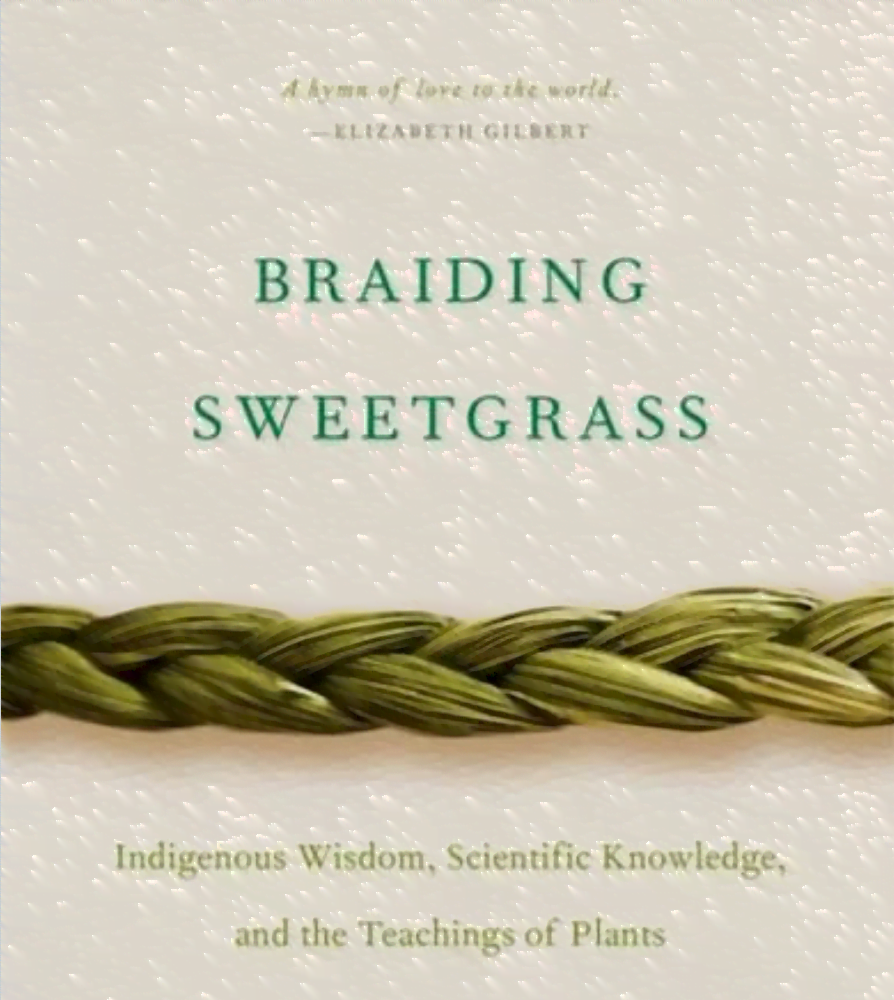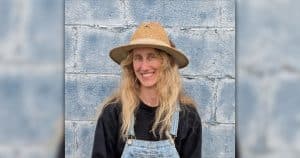Humans are at a crossroads currently on planet earth. So are many species. Unless you live in a media free bubble and never step outside, you are aware of our rapidly changing global climate and its effects on life on the planet.
It’s tempting to curl up helplessly and try not to think about it but ethical and moral imperatives demand that we face this head on for the sake of future generations. Robin Wall Kimmerer in her book Braiding Sweetgrass: Indigenous Wisdom, Scientific Knowledge, and the Teachings of Plants discusses through Indigenous storytelling and plant science solutions for fixing what is environmentally broken and what needs to happen to prevent climate related mass extinction … including our own demise as a species.
She writes “Sweetgrass, as the hair of Mother Earth, is traditionally braided to show love-care for her well-being. Braids, plaited of three strands, are given away as signs of kindness and gratitude.” Sweetgrass (hierochloe odorata in Latin and wiingaashk in Ojibwe) is a teacher Kimmerer introduces to us. The essential teaching from the sweetgrass plant is a commitment to humility, a switch to relational economics (between humans to each other and to other species and the planet), and a willingness to learn from plant and animal species … to listen to what they are trying to tell us.
Kimmerer is an enrolled member of the Citizen Potawatomi Nation in the Upper Great Lakes region (prior to forced relocation to Oklahoma), who along with other Indigenous cultures are people of gratitude. The core values are gift giving and thankfully receiving gifts from nature and each other. Extensive prayers of thanks to all the elements: fire, air, water, and the earth, to teaching and healing plants, to land creatures, water creatures, insects, birds, the sun, the moon … all are given heartfelt thanks before communal gatherings. These people see humans as the “youngest brother species” and therefore are perpetual students of all other older species.
This way of life on “Turtle Island” (Native Americans’ name for North and Central America before the arrival of Europeans) was sustainable for everyone who lived by gratitude and personal restraint. It kept the environment healthy. An example of certain teachings by the elders included bypassing picking the first fruits or plants until several were seen. The same principles applied to all fishing, hunting, foraging. This restraint insured a future for all species and kept the ecosystem diverse. For planting, monoculture was discouraged. Kimmerer talks of the “three sisters” method of planting corn, beans, and squash together to keep the soil nutritive. Caring for the plants rather than demanding high yield is the philosophy here. The author discusses how our dominant profit-based transactional culture harms the environment, cutting off our relationship to nature and to each other. She argues that this is making the planet and all its inhabitants sick and lonely. She first and foremost says we need to drop our arrogance and not think (and act) as if we are the best species because that has led to exploitation of the earth, plant, and animal species, and each other.
We also need to stop idolizing profit over everything else.
She likens our non-stop drilling/digging for fossil fuels as theft from the earth. The same is true for our unsustainable fishing methods. Burning fossil fuels for energy chokes the air and warms the planet … like fevers in humans during an active viral infection. She claims our cultural shift economically must change from transactional profiteering and unchecked consumption to one of relational thoughtful gift giving and gratitude for what nature gives us freely. She says that all beings teach us what they need from us as they give to us from their bounty. An Indigenous story that describes this need for consumption is the wendigo. The wendigo is a fearsome winter-time creature that roams the earth during lean times when food stores are dwindling. The creature tries to devour everything and becomes more ravenous with everything it consumes. Does this sound familiar in our current collective consciousness? The elders tell wendigo stories to teach children to value others’ needs and to curtail one’s selfish impulses to avoid becoming the wendigo monster. People closely connected to nature and the seasons need each member to survive so selfishness and greed are considered dangerous to the well-being of the whole community.
I would argue that we are globally in a wendigo process that will destroy us. It’s a matter of beginning to love the earth, give gifts to her and each other, and to allow gifts back from the earth, her creatures, and each other. Kimmerer deliberately asks plant species she works with what the lessons are she needs to learn from them and what do they need back from her. I am reminded of how our culture can embrace these values … perhaps mutual aid societies, farm co-ops, reuse of all materials, thinking about how products are made and mentally thanking the materials that go into these and thanking the hands that assembled these. Asking oneself if one needs every purchase or if that purchase will feed one’s wendigo or addictive nature. Kimmerer makes a great point that these are the seeds of addiction…whether to food, sex, drugs, gambling, work, mobile device use, or “stuff.” It is the desperate filling up to fight emptiness and loneliness one experiences when out of relationship to nature and to each other. Wendigo spirit is at the heart of despair, whether by envy or insatiability. Our culture’s worship of profit and push for unchecked consumerism drives this condition. We’re at a tipping point where nature may soon be unable to gift us or teach us.
She prescribes the following to stop our wendigo nature and reverse climate catastrophe:
“Know the ways of the ones who take care of you, so that you may take care of them. Introduce yourself. Be accountable as the one asking for life. Ask permission before taking. Abide by the answer. Never take the first, never take the last. Take only what you need. Take only that which is given. Never take more than half. Leave some for others. Harvest in a way that minimizes harm. Use it respectively. Never waste what you have taken. Share. Give thanks for what you have been given. Give a gift, in reciprocity for what you have taken. Sustain the ones who sustain you and the earth will last forever.”
We can become aware of how and by whom everything is made and grown and give thanks at every stage: from planting, to tending, to harvesting to returning to the earth. It’s all about thinking of ourselves as all equal to each human, all equal to all species, given life through the elements, and relational and reciprocal in gratitude. How do we give back to thank and honor our fellow humans, non-human siblings, and the earth? A start is receiving resources as one receives a loving gift from a close friend. You wouldn’t think to break into their home to take something not freely given. You would not try to profit off what you had taken without permission. Think of our environment as a friend who gives love and gifts freely. Thankfully give gifts back that are asked for and sustainable.
This will bring healing to all entities on the planet.







